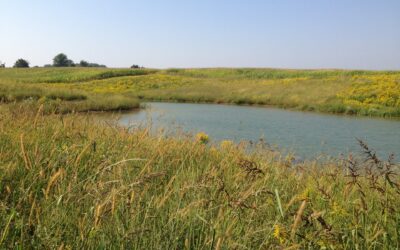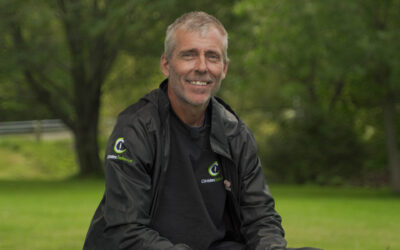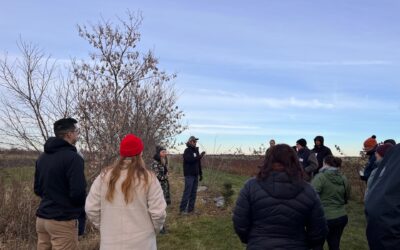DFO’s Canada Nature Fund for Aquatic Species at Risk grants ALUS Canada $983,000 to improve aquatic habitat in the Prairies.

ALUS Canada announces a $983,000 contribution from Fisheries and Oceans Canada, via the Canada Nature Fund for Aquatic Species At Risk, to improve aquatic habitat in the Prairies. Pictured here: Western Silvery Minnow by Joe Tomelleri. Used with permission.
ALUS Canada, A Weston Family Initiative, is thrilled to announce $983,000 in funding from the Canada Nature Fund for Aquatic Species At Risk (CNFASAR), a Fisheries and Oceans Canada (DFO) program.
This important new contribution, which represents up to 50% of other non-federal partner contributions, will allow ALUS to launch a project entitled “Engaging Farmers and Ranchers to Improve Ecosystems for Aquatic Species at Risk,” to improve aquatic habitat in the Prairies over the next four years.
“Through the Canada Nature Fund for Aquatic Species at Risk, our Government is continuing to protect and promote the species we are at risk of losing,” said Bernadette Jordan, Minister of Fisheries, Oceans, and the Canadian Coast Guard.
“We know this must be a shared responsibility, which is why we are so pleased to be partnering with ALUS Canada in this vital work. This project will focus on private lands where the agricultural landscape intersects with key freshwater habitat and it will help protect five species in the southern Prairies,” Minister Jordan concluded.
The project will specifically target five species at risk—Bigmouth buffalo, Carmine shiner, Lake sturgeon, Plains minnow and Western silvery minnow—in eight ALUS communities in the South Saskatchewan River and the Assiniboine River watershed basins, all lying within the CNFASAR Southern Prairies Priority Area.
“ALUS Canada is eager to use this federal funding to deliver new and improved habitats for aquatic species at risk in our Prairie ALUS communities,” said ALUS Canada CEO Bryan Gilvesy.
“We are grateful to Fisheries and Oceans Canada for its leadership in supporting the innovative work being done by our Prairie agricultural communities. We know that farmers and ranchers can provide solutions to some of the most critical environmental issues facing Canadian society, including biodiversity loss.”
Facts at a Glance
- $983,000 in new DFO funding to ALUS Canada
- 1,325 acres of ALUS riparian projects
- 32 farmers and ranchers managing ALUS projects on their land
- 8 ALUS communities in Manitoba, Saskatchewan and Alberta
- 6 events to inform communities (TBC)
- 5 aquatic species at risk in the southern Prairies
- 1 series of fact sheets
This funding will allow ALUS to improve riparian wildlife habitat on 1,325 acres (five square kilometers) of wetlands and riparian areas along streams, creeks and rivers which flow into the South Saskatchewan River or the Assiniboine River. A total of 32 participating farmers and ranchers will establish ALUS projects on marginal and environmentally sensitive parcels of their land to restore freshwater ecosystems in their communities.
There are many types of ALUS projects that improve and protect habitat for aquatic species at risk, such as establishing wetlands, using water control structures and plugs, establishing riparian buffer zones along streams, using cattle-proof fencing and offsite waterers, and planting an appropriate combination of native trees, shrubs and plants in these areas.
These ALUS projects not only provide wildlife habitat and sequester carbon, but also effectively capture agricultural runoff and soil eroding from cultivated fields, to prevent the sedimentation of streams. In this way, ALUS projects produce cleaner water to improve fish habitat in local rivers and lakes, and increase their potential to harbour and support the targeted species.
The CNFASAR contribution will also support education and outreach around aquatic species at risk. For example, ALUS Canada will develop a series of educational brochures describing the five species in question and hold a series of six public events in local agricultural communities (TBC post-pandemic).

ALUS projects will help protect aquatic species at risk in the Prairies, such as the Lake Sturgeon (illustration by Joe Tomelleri used with permission.)
“After conducting a comprehensive review of the scientific literature relevant to each species, our fact-sheet series will highlight their habitat, their biggest threats, their best management practices, and how ALUS farmers and ranchers can help them through improving wildlife habitat in riparian and aquatic areas of their farms,” said Paige Englot, ALUS Canada’s Prairie Hub Manager, who is leading this project.
Stay tuned to ALUS Canada’s social media feeds and enewsletters for news around the launch of these scientific resources and public events.
“ALUS Canada is excited to be building a relationship with Fisheries and Oceans Canada,” Englot added, noting that ALUS has previously received species at risk funding provincially—from the Ministry of Natural Resources and Forestry and the Ministry of Environment, Conservation and Parks in Ontario—and there has been community-level success with the Habitat Stewardship Program for both freshwater and terrestrial species, but this is the first time ALUS has received federal species at risk funding.
ALUS Partners in the Prairies
ALUS Canada is active in the CNFASAR’s Southern Prairies Priority Area through partnerships with its important local community partners:
- In Saskatchewan, ALUS Canada is proud to work closely with the Assiniboine Watershed Stewardship Association (ALUS ASAP), and the Wascana and Upper Qu’Appelle Watershed Association (ALUS WUQWATR), to improve habitat for aquatic species at risk.
- In Manitoba, ALUS Canada will partner with the Little Saskatchewan River Conservation District (now known as the Assinibione West Watershed District) for this project.
- And in Alberta, five of ALUS Canada’s municipal partners will participate through their ALUS programs: Red Deer County, Mountain View County, Rocky View County, Vulcan County and Wheatland County.




